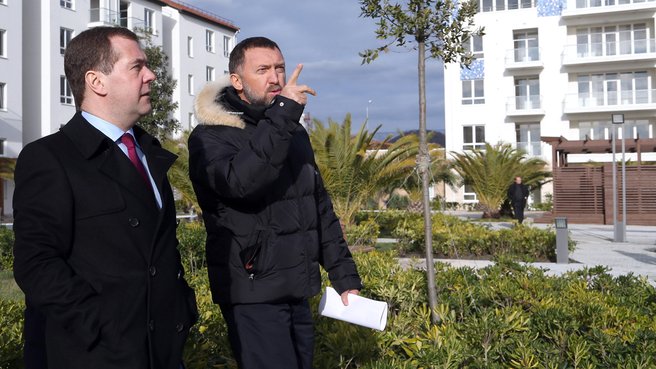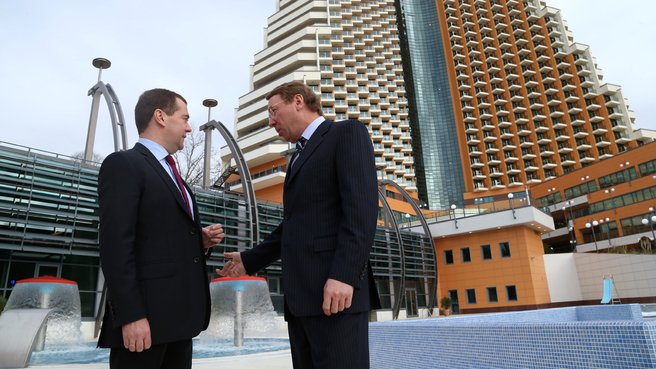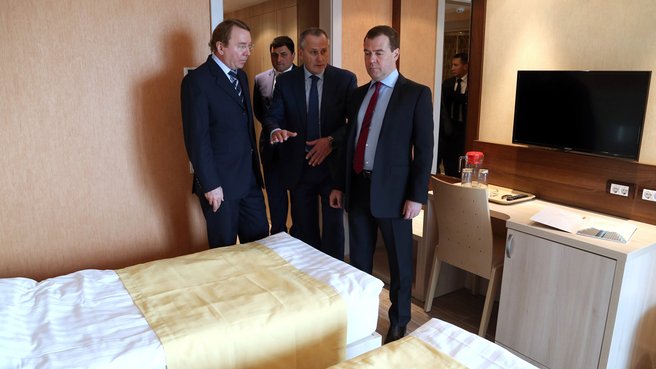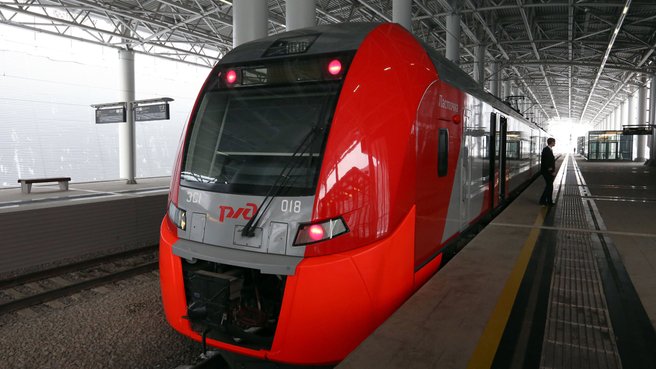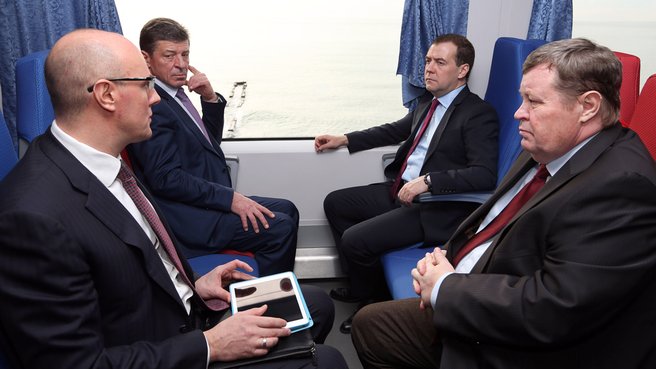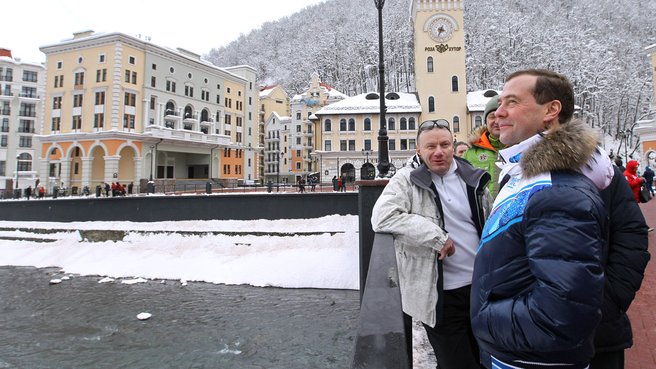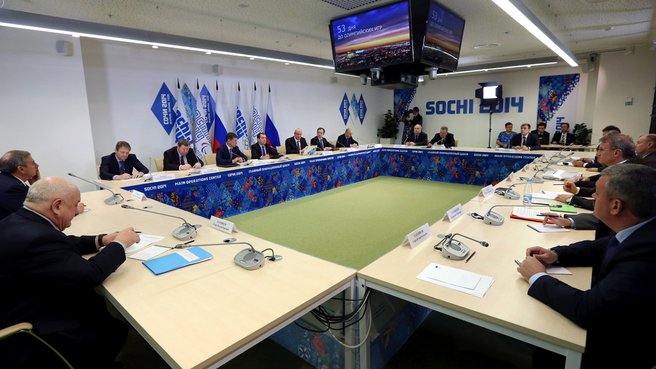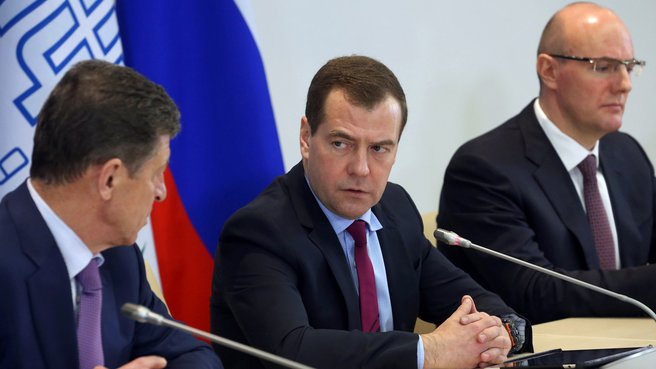Inspection and meeting in Sochi.
Dmitry Medvedev inspects the Dagomys health resort as part of his working visit to Sochi
Inspection of the Olympic Village
Dmitry Kozak and Dmitry Chernyshenko respond to questions from journalists
Dmitry Medvedev inspects the Dagomys health resort
Dmitry Medvedev and Chairman of the Bazovy Element Supervisory Board Oleg Deripaska
The Dagomys health resort has re-opened after major renovation that has significantly expanded its sports and recreational infrastructure. In particular, it now has a modern medical and diagnostic centre and a luxury spa complex. Members of the Russian Olympic team will get the chance to use it prior to the Olympic Games.
Dmitry Medvedev also visited the optometrist’s office, bath department of the medical centre, and Dagomys guest rooms.
***
Dmitry Medvedev inspects the Olympic Village in Sochi
The Olympic Village will accommodate athletes, as well as members of the IOC, the national Olympic committees and international sports federations.
The Olympic Village will accommodate about 3,000 people. Athletes will live in double rooms with all the amenities except a kitchen, because, under the IOC rules, Olympic athletes are to take their meals in restaurants.
* * *
Dmitry Medvedev: Good afternoon, ladies and gentlemen.
Today we are all dealing with a very important issue, which naturally falls within our area of responsibilities within the Government and other agencies involved in Olympic preparations. Today we’ll discuss in brief some questions linked with the preparations for the Olympic and Paralympic Games. There are just 53 days left before the start of the Games.
Yesterday and today Mr Chernyshenko and I went on a tour to inspect some facilities. Of course, the bulk of facilities in the mountain and coastal clusters are ready for the Games, as they should be by this time. Many have been tested by hosting national and international competitions. We should conduct another four final events by the end of December. I’m confident they will be held at the proper level.
Today we’ll discuss some details, including the post-Olympic infrastructure and the region’s development. Today we visited several facilities, including new hotels, the Dagomys health resort and the railway.
Dmitry Medvedev: "The bulk of facilities in the mountain and coastal clusters are ready for the Games, as they should be by this time. Many have been tested by hosting national and international competitions. We should conduct another four final events by the end of December. I’m confident they will be held at the proper level."
The main thing is to make sure that after the Olympics Sochi becomes a comfortable and modern city. We want all those who live and work here and Sochi’s guests to be pleased with the city.
Today I signed a Government directive on the free transfer of 86 plots of federal land to the city. In all, 300 plots of land will be transferred for various purposes – construction of hotels, arrangement of beaches and other recreational needs. I hope after the Olympics these hotels will pay off. I will also sign papers on plots of land for infrastructure and other purposes.
We’ll review a number of other issues at our meeting. Mr Chernyshenko (addressing Dmitry Chernyshenko), could you say a few words about current affairs?
Dmitry Chernyshenko (president of the autonomous non-profit Organising Committee of the 22nd Olympic and 11th Paralympic 2014 Winter Games in Sochi): Mr Medvedev, as you rightly said, only 53 days are left before the Sochi Olympics and 81 days before the Paralympics. Today our main goal is to make facilities ready for the Olympics. We are now finishing the assembly of facilities that won’t be needed after the Games. This includes over 100,000 square metres of tents and temporary grids. We are also expanding the public catering network. Every day we’ll feed over 185,000 personnel, client groups and spectators. We are paying special attention to sports technology. All measuring equipment is in place. The best specialists from all over the country are working at all the facilities, preparing the ice, snow and tracks. They are responsible for the operation of these facilities.
All of the facilities have an ample supply of everything that they might need to ensure seamless operation. They all have two independent power supply sources, plus we have 125 DGUs with a total capacity of 111 mW.
Dmitry Medvedev: What is DGU?
Dmitry Chernyshenko: A diesel generator unit. We have built the most powerful and probably most advanced telecom infrastructure in Russia. All facilities are connected to a dedicated broadband connection with a gigantic capacity of 140Mb/sec.
Dmitry Medvedev: Please make sure that the connection is steady. I checked it yesterday at different locations and found out that the steady signal was a problem in many of them.
Dmitry Chernyshenko: You are right. We have installed 685 2G/3G base stations that will provide Internet access to the Games for 280,000 subscribers. The LTE coverage of all Olympic Park areas will also be available, meaning that 4G will also be used. Megafon will provide technical roaming for all of the major Russian mobile operators. The Data Processing Centre located in the Adler-based Rostelecom office is our largest IT facility. It has 329 servers and a 620 Petabyte database that is serviced by 50 different IT systems.
Dmitry Medvedev: I believe, it’s terabytes, not petabytes.
Dmitry Chernyshenko: Right. Terabytes.
Dmitry Medvedev: The numbers that you give will go off the charts, if you measure them in petaflops.
Please continue.
Dmitry Chernyshenko: On 6 December, we installed and held a comprehensive test of the equipment that we’ll use during the Games. We’ve run 600 different scenarios and continue with the equipment setup. The latest equipment and technology, such as cable and track cameras, shooting from dirigible balloons and helicopters, will be used in Sochi. This has never been done before. The innovative 8K Super Hi-Vision technology will be used, which is twice as high-def as what we see in cinemas and 16 times more than the regular hi-def. The audience will see every detail of the action and every emotion on their TV screens. For the first time in the history of the Games, media representatives will be issued over 3,000 tablets that will replace paper-based information packages. Before, stacks of paper were handed out after each performance. We have replaced this with innovative equipment.
Dmitry Chernyshenko: "For the first time in the history of the Games, media representatives will be issued over 3,000 tablets that will replace paper-based information packages."
The Russian consortium of copyright holders that includes the First Channel, VGTRK and NTV-Plus is developing its own signals to cover specifically the performances of Russian athletes. The Games will be covered by 90 TV and radio companies for 123 countries.
Our facilities operate at 40% of their design capacity. We have about 7,000 tonnes of property and equipment stored on almost 40,000 square metres of warehouses.
The Olympic Park is the largest facility that you saw today. It’s as big as its London-based counterpart and can accommodate about 85,000 spectators. We are assembling the offices of the national Olympic committees of Canada, Switzerland, the United States, Italy and Kazakhstan. The organising committees of the countries that will host Olympic Games next are building their respective houses.
We are building the Russia House where our fans will gather. As I’ve reported to you, the Olympic Park will host the expositions of the regions. It will additionally host the residence of Father Frost, the pavilions of our international partners, the Olympic shop, and the Olympic Square for celebrations and award ceremonies. Starting with our Games, all athletes will be awarded not at sports facilities (only the flower ceremony will be held there), but at the Medal Plaza crowded with people.
Dmitry Chernyshenko: "Our primary goal is to preserve all of the facilities during the Paralympics, so that the visitors to the park could enjoy them as much as during the Olympics."
Our primary goal is to preserve all of the facilities during the Paralympics, so that the visitors to the park could enjoy them as much as during the Olympics.
A team of 7,000 people will provide round-the-clock service in all three Olympic villages. You’ve seen that the assembly of temporary infrastructure facilities is in full swing. Apart from the buildings transferred to us by investors, in which we assemble our furniture, we are also establishing temporary outpatient clinics, gyms, dining rooms for athletes, shops, and interreligious centres – in a nutshell, everything that athletes need under the regulations. However, as we’ve set high standards and the next hosts of the Games may find them difficult to match. We have the best accommodation. On average, there are 21 square metres per person in the Coastal Village – much more than the Olympic regulations require. The majority of the Olympic athletes (85%) will live within walking distance of their facilities.
Dmitry Medvedev: I hope such conditions will help them to improve their performance. I’m referring to all athletes, not just ours.
Dmitry Chernyshenko: Our and foreign teams will start moving into hotels beginning on 30 January. We expect about 6,000 delegation members, including 3,000 Olympic athletes and around 1,600 delegation members. About 700 athletes will arrive for the Paralympics.
Dmitry Chernyshenko: "There will be 210 twin trains during the Games, and almost 5 million trips."
As local residents, you had the chance to appreciate the transport system. New routes are very convenient and most importantly we launched new commuter electric trains between the city, the mountains, and the Olympic Park. There will be 210 twin trains during the Games, and almost 5 million trips. As we discussed, we are now considering making railway transport free not only for our client groups and spectators with tickets, but for all of the city’s residents and guests.
A new motor road has been launched. It has reduced by two times the journey to the Mountain Cluster. Its capacity is up to 20,000 passengers per hour. Nobody had such a road during the Games. In effect, it blurs the difference between the mountain and coastal cluster. People can choose any and just drive down the road.
A Moscow airport will meet 1,000 volunteers and bring them here. A new VIP-terminal is already operating in Sochi and a Government terminal will be put into service before the year’s end. We are expecting the arrival of at least 33 heads of state and Government. This is a fairly serious burden, but the airport will cope with it. Its estimated capacity is 3,800 passengers per hour and we’ll test it.
As you’ve seen today, we are closely following the implementation of our commitments to investors on hotels.
We have signed 874 contracts and most investors meet their obligations under them. Clients are provided with 23,500 rooms. All of the contracts have been disbursed and the investors have received money. Rooms that are not used for housing client groups will be provided to spectators.
About 65,000 employees of the Organising Committee support staff and volunteers will service the Games. From 23 December, we will start to equip the Olympic staff. This uniform will be worn by 45,000 people. We tested it during the last season and it proved to be sound…
Dmitry Chernyshenko: "The Olympic tickets are selling very well. The most popular events are the hockey and biathlon competitions and the opening and closing ceremonies. The Russians will purchase 75% of the tickets. The tickets for almost all of the events are available online. Those who have purchased the tickets are included in a special database and enjoying a special mail-out. So, they have a definite advantage."
Dmitry Medvedev: During which events was it tested? Did it turn out to be low-temperature resistant or what?
Dmitry Chernyshenko: During test events, 8,000 volunteers wore this kind of uniform, but of a different colour. We monitored the process and filled reports receiving the feedback – if it is waterproof, cold resistant, breathable, and so on.
As you know, a total of 25,000 volunteers will be involved. We already know them by name and have trained them, with a 20% reserve. The Paralympics will involve 9,000 volunteers. They are being trained in regional volunteer centres. As of 4 January, the first volunteers will arrive and we will begin the on-site training with its professional specifics.
You have toured the main operational centre. It is the core of the Control Centre, as all of the information goes there.
It is important to comment on tickets. This is a topic of everyone’s concern. The Olympic tickets are selling very well. The most popular events are the hockey and biathlon competitions and the opening and closing ceremonies. The Russians will purchase 75% of the tickets. The tickets for almost all of the events are available online. Those who have purchased the tickets are included in a special database and enjoying a special mail-out. So, they have a definite advantage.
Dmitry Chernyshenko: "I’d like to thank Russia’s regions for their efforts to organise the Olympic Torch relay. Forty-nine regions have hosted the relay so far. The Olympic Flame has been to the North Pole, the bottom of Lake Baikal and was taken by cosmonauts into space. Today, the people of Shadrinsk and Chelyabinsk welcome the Olympic Flame. Looking forward, we also have the Paralympic relay, which will cover 46 cities in 45 regions across all eight federal districts."
Dmitry Medvedev: Close attention should also be given to the sale of tickets for the Paralympic Games, which is another important issue, since this kind of competition is new for us.
Dmitry Chernyshenko: You’re right. We are attaching special attention to social programmes to distribute tickets that will enable thousands of school students, undergraduate students and retirees to attend the Games. We are offering group tickets for the Paralympic Games to schools, and special programmes are being implemented in cooperation with the Krasnodar Territory and nearby regions. It goes without saying that Russian Paralympic athletes are the best in the world, and we hope that they’ll achieve great victories. By the way, Canada hosted a stage of the Biathlon World Cup this week, and Russians won 15 medals out of 18. Great job!
Dmitry Medvedev: What a great result!
Dmitry Chernyshenko: We naturally expect that… Paralympic sports are actually something new for us.
Dmitry Medvedev: That’s what I mean. We have to promote Paralympic sports among spectators.
Dmitry Chernyshenko: In this respect, we count on your support.
Dmitry Medvedev: This goes without saying.
Dmitry Chernyshenko: You have traditionally patronised this area.
Just a few words about the relay. I’d like to thank Russia’s regions for their efforts to organise the Olympic Torch relay. Forty-nine regions have hosted the relay so far. The Olympic Flame has been to the North Pole, the bottom of Lake Baikal and was taken by cosmonauts into space. Today, the people of Shadrinsk and Chelyabinsk welcome the Olympic Flame. Looking forward, we also have the Paralympic relay, which will cover 46 cities in 45 regions across all eight federal districts. I won’t disclose any secrets, but take my word that the Paralympic relay will also be a memorable event.
Dmitry Medvedev: Thank you, Mr Chernyshenko. Let’s get down to the agenda.
<…>
***
Dmitry Kozak and Dmitry Chernyshenko responded to questions from journalists following a meeting on the readiness of Olympic facilities for the 2014 Winter Games
Transcript
Question: A question for Mr Kozak, if I may. Maxim Tovkailo, Vedomosti. The Finance Minister has just said that the decision was made at the meeting to extend the grace period for investors on VEB loans, that they will start paying them off in 2016. Is that right?
Dmitry Kozak: They will begin to repay their loans in accordance with the relevant agreements starting in 2016. This doesn’t mean that someone will be relieved of paying debts on loans. We’ll agree on what share of revenues should be left for the operation of all owners of the Olympic facilities.
Investors will redeem their loans – either the principal or the interest – depending on what they can afford during this period. Neither we, nor the Government, nor investors are able to make a balanced decision on the expected revenues of specific facilities. For the time being financial models exist only in theory and are often mutually exclusive. The bank has financial models; each investor has his own models. Some of these are more optimistic, others are less so. Investors are different, and so on.
We decided to test all these models empirically and let investors test these models in the post-Olympic period (one summer and one winter season). They will work with Vnesheconombank, estimate money flows and see whether sales are good. Many investors, especially the owners of apartment-style hotels, intend to sell them after the Games. Funds from the sale of foreclosed property will redeem debts, but we won't demand any full interest payments until 31 December 2015. These are normal decisions taking into account the interests of both the state and investors. I think everyone is pleased.
Question: Can you comment on the Deripaska case? I have the same question for Mr Chernyshenko. When they inspected the facilities in the Olympic Village, it was stated that RogSibAl did not receive certain funds from Vnesheconombank. You said that the decision was made in October, so they can go and receive these funds. They said that they couldn’t get them. Meanwhile, the cost of their project has increased from 22 to 25 billion…
Dmitry Kozak: This is both a complicated and simple case. The decision to grant additional funds upon the investor’s request was made as early as December 23. It didn’t even provide for any special checkups of whether additional sums were justified.
However, to receive a loan, it is necessary to comply with the terms of crediting in any bank. We have made a general decision for all Olympic investors without exception. They should provide additional guarantees for further sums that surpass 70% of the cost of their projects (sums in excess of 70% are financed by VEB). They should be guaranteed not only with pledged property, but also with some additional collateral (as a rule, this is other pledged property). Investors should guarantee the return of these funds and shouldn’t become our contractors. At one point in time, many investors asked VEB to provide funds exceeding 70% of the costs of their projects. In other words, they invested less than 30%. On April 2, 2012, the Government and VEB’s Supervisory Board made a common decision on providing guarantees for additional sums.
Today, we made the final decision and told Mr Deripaska – you can take as much money as you want within the limits of the sum requested. On the same day, you’ll receive a sum if you can guarantee the return of the loan that exceeds 70% of the cost of your project. This is not a problem at all. It’s a simple case. Bazel has suggested that some lands in the Kuban area may become collateral. Their cost is being assessed now.
Question: It was mentioned today that 300 federal plots of land will be transferred to the city. What are these plots like? How large are they and where are they located?
Dmitry Kozak: Probably, I won’t be able to tell you which area they occupy. These 315 plots are sections of beach territories that are formally in federal ownership. You understand what federal property means. It’s like collective farms in Soviet times. They belonged to nobody and nobody took care of them. We have held an inventory of all of the beaches and are transferring them to the city with a single goal in mind – so that the city can grant a concession on them primarily to hotel owners, so that they can look after these territories. However, no concession can turn beaches into private lands. Hotel owners need to ensure general access to these territories (this is world practice). They may have a number of privileges for their guests, and their duty will be to maintain everything properly.
Question: Will beaches become city property all over Sochi? This is not related to the Olympic project, is it?
Dmitry Kozak: Yes, this will be done on Sochi’s entire territory – from Lazarevskoye to the border with Abkhazia. We will also transfer some federal plots to the city for commuter and other parking lots for the Olympics and the post-Olympic period. I think that this decision is fully justified. It is necessary to do this throughout the country because federal bodies do a poor job in the regions or municipalities. Local Government bodies can be much more efficient because they are responsible to their population for improving the territory and making better use of it.
Question: Are these territories near the sea? You are referring to beaches, aren’t you?
Dmitry Kozak: Yes, Mr Medvedev said today that he had signed а directive on the transfer of 86 plots for beaches. More Government directives on parking lots and beaches have been submitted for signing.
Question: How many hectares or square metres do they occupy?
Dmitry Kozak: We have this information. The inventory has been conducted… There is an enormous number of land plots.
Question: Regarding the Paralympic athletes, could you tell us why twice as many rooms were built for them?
Dmitry Chernyshenko: First of all, we had an ambitious candidature file, which included exactly that number of rooms, including those for the Paralympic athletes, in order to appear competitive compared with other contenders for the Games, in particular, with Salzburg in Austria or Pyeongchang in South Korea. We were neck and neck with them.
After Russia won in Guatemala, this constituted a contract obligation on Russia's part that needed to be fulfilled. Then the investors were shown the proposed facilities, and, I would like to stress, of their own free will decided to construct these facilities in accordance with the commitments assumed by the Russian side. They constructed not just resorts, or hotels, or apartments, but Olympic facilities. Of course, we understood that the post-Olympic legacy was the main driver of the financial success of these projects.
What did we talk about today? We said that additional expenditures have cropped up for them to adapt the Olympic infrastructure, created in accordance with high standards set by the International Olympic Committee, to everyday life. In ordinary life, such a large number of people with disabilities are unlikely to converge on a single place, though there are European standards for the number of such rooms and for an accessible environment.
Here, Sochi serves as a model for other Russian cities, so there were no excessive demands. Everything was performed in accordance with the candidature file’s requirements. It is no secret that sometimes the investors, taking into account the post-Olympic use of facilities, did more than was stipulated by the IOC, but this was just their own initiative.
Question: Could you tell please, how many Paralympic rooms were built and what hotel fund we have in accordance with the candidature file?
Dmitry Chernyshenko: The candidature file stipulated 57,000 rooms that we could reliably offer to so-called client groups, and the minimum amount for spectators, especially foreign spectators, who are not able to make use of Sochi’s private sector. According to unofficial estimates, Sochi can receive up to 300,000 visitors at a time, accommodating them in the private sector. Then, in agreement with the IOC, this number was reduced to 41,000. This quantity of rooms has been more or less provided by the Olympics organisers and investors. All client groups have been housed, and the remaining unneeded rooms went on the open market through the Greater Sochi single room distribution centre. So, and I stress, there are available rooms. Those who say that it is impossible to find accommodation in Sochi, this is…
Question: Hotel rooms?
Dmitry Chernyshenko: Yes. This is not true. There are plenty of rooms. Sochi awaits its guests!
Question: To the best of my knowledge, you told Mr Medvedev today that officials were studying the possibility of allowing Sochi residents, not only just client groups, to ride Lastochka commuter trains free of charge.
Dmitry Chernyshenko: We would like to see this very much because, as you should understand, the city’s transit infrastructure is being revolutionised. Previously, it was possible to reach any place in the city using shuttle taxis. And because Sochi outnumbers Moscow in the number of private vehicles, then it’s quite naturally, that owing to the geographic specifics of Sochi, which is among the longest cities in the world (147 kilometres), this caused a local transport collapse. Therefore, city authorities developed a new transit infrastructure and a new transit plan enabling large-capacity buses and feeder lines to carry passengers from uptown districts to Kurortny Prospekt – the main transit route – and two bypass roads. And, naturally, the railway and our Olympic Lastochka trains will carry most passengers, specifically, about 12,500 people per hour, from central Sochi and from Dagomys to the Olympic Park.
First of all, this, of course, primarily involves a switchover to the European model, which implies that people should actively use efficient and environmentally friendly city transit. In order to achieve this goal as fast as possible … We should understand that there are client groups and those who have bought tickets that have the right to use Olympic transport, including Olympic buses and trains, free of charge in accordance with client group lists. Here, we reimburse Russian Railways for the difference between economically justified prices and commuter zone fares, and the Organising Committee pays these expenses. In turn, over the past seven years, Sochi residents have experienced discomfort as the result of what is probably the largest construction project in the world. As we see it, they deserve not to pay the difference between economically justified prices and current ticket prices. They should also be able to test and appreciate the advantages of the new city transit system free of charge. Previously, this transit system, or Lastochka trains, to be more exact, was not used very actively. Currently, six trains will operate, and each of them will accommodate 2,000 passengers. These trains will ensure quite impressive passenger traffic volumes. And we would very much like to allow all Sochi residents to test this transit system during the Olympic Games. In effect, this would amount to an “open doors day.” This issue is currently being examined by the administration of the Krasnodar Territory, which should review this compensation plan and its feasibility. For its part, the Organising Committee will, in any case, finance the travel expenses of its client groups and of those who purchase tickets.
Question: It appears that everyone, including journalists, athletes and client groups, will ride free of charge during the Olympic Games. Will Sochi residents also ride free of charge now?
Dmitry Chernyshenko: In my opinion, it would be somewhat unfair if all visitors, even including esteemed journalists …
Question: So, will they have tickets?
Dmitry Chernyshenko: Of course, in any case, they will ride free of charge, and we would like someone to take care of Sochi residents, as well. Because there will be some small-scale inequality …
Question: So, free of charge for all?
Dmitry Chernyshenko: Free of charge for all.
Thank you very much.
